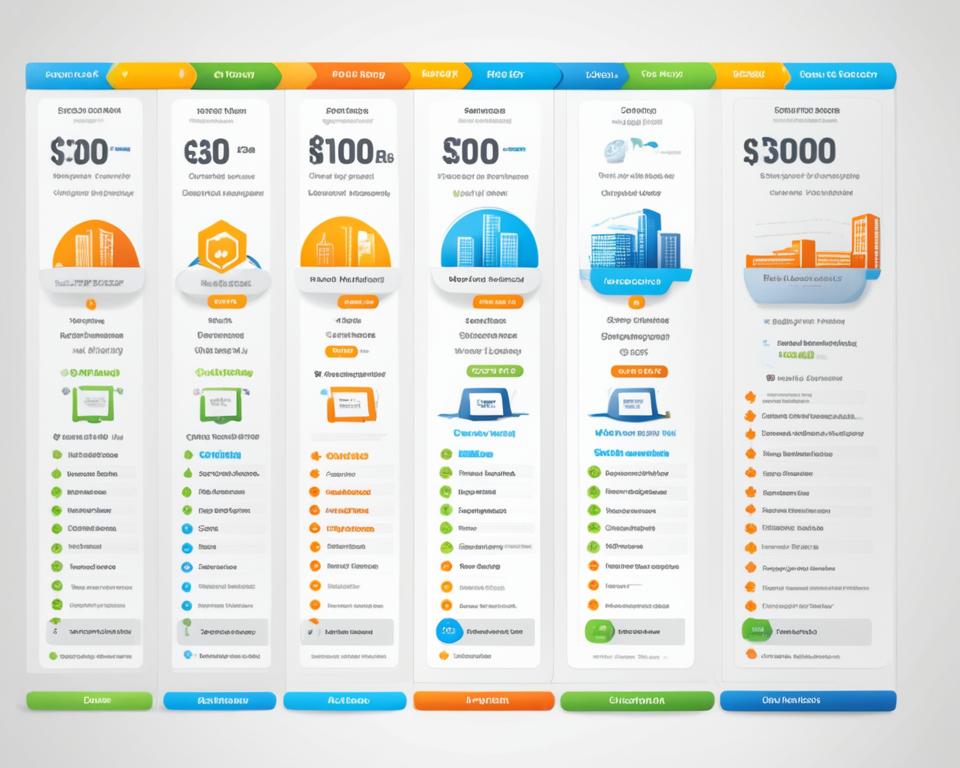Welcome to our guide on the top web hosting companies to consider for your website. Choosing the right web hosting provider is crucial for ensuring your website’s performance, security, and reliability. With numerous options available in the market, it can be challenging to find the best web hosting service that meets your specific needs. In this article, we will review and rank the top web hosting companies for 2024, based on factors such as affordability, reliability, customer service, and more.
Key Takeaways:
- Researching and selecting a trusted web hosting provider is essential for your website’s success.
- Consider factors such as affordability, reliability, customer service, and scalability when choosing a web hosting company.
- The top web hosting companies for 2024 include IONOS, HostGator, Bluehost, DreamHost, InMotion Hosting, MochaHost, GoDaddy, Hostwinds, InterServer, and TMDHosting.
- Read web hosting reviews and compare features to make an informed decision.
- Different types of web hosting, such as shared hosting, VPS hosting, and dedicated hosting, cater to different website needs and budgets.
What Is Web Hosting?
Web hosting is a service that allows individuals and businesses to make their websites accessible online. When you create a website, it needs a place to live on the internet. That’s where web hosting comes in. It provides the server space and resources necessary to store your website’s files and make it available to visitors.
Web hosting is like renting a plot of land on the internet where your website can be built and accessed. It involves storing your website’s domain name, HTML code, images, and text on a server. This server acts as a powerful computer that’s always connected to the internet, ensuring your website is available 24/7.
There are different types of web hosting services available, each with its own features and advantages. Some website builders, like Squarespace and Wix, include web hosting as part of their packages. This means you can create and host your website all in one place. However, if you choose to use a platform like WordPress, you’ll need to find a separate web hosting provider, such as MochaHost or IONOS, to store your website files.
Web hosting plays a crucial role in determining the performance, security, and reliability of your website. Choosing the right web hosting service that aligns with your needs and goals can contribute to a seamless online presence and positive user experience.
Content Management Systems and Web Hosting
Content management systems (CMS) make it easier to create and manage websites without extensive coding knowledge. Popular CMS platforms include Squarespace, Wix, and WordPress. These platforms often include web hosting as part of their services, eliminating the need for separate hosting providers.
If you choose to use Squarespace or Wix, you can create your website directly on their platforms, and they will handle the web hosting for you. This simplifies the process, especially for beginners or those who prefer an all-in-one solution.
On the other hand, WordPress is a highly flexible CMS that allows for extensive customization and functionality. While WordPress itself is free, you will need to find a web hosting provider, such as MochaHost or IONOS, to host your WordPress website. This gives you more control over the hosting environment and allows for scalability as your website grows.
Web hosting is essential for making your website accessible online, whether you’re using a CMS platform like Squarespace or Wix that includes hosting or a self-hosted platform like WordPress that requires separate web hosting.
How Does Web Hosting Work?
Web hosting works by providing a place for website content to live on a server. The server acts as a connection between users and the website, similar to a condo building or office building. Just as people access different units or offices within a building, web hosting allows users to access the website and view its content.
When someone visits your website, their web browser sends a request to the server where your website is hosted. The server then retrieves the necessary files and resources and sends them back to the user’s browser, which displays the website accordingly. This process happens seamlessly, allowing users to interact with your website without needing to understand the underlying technicalities of web hosting.
Imagine the server as the foundation of the building, supporting multiple websites, just like floors in a condo or offices in an office building. Each website has its own space on the server, ensuring that its content remains separate from others. This separation ensures that website performance, security, and data integrity are maintained for each individual website.
Web hosting providers offer different types of hosting plans – shared hosting, VPS hosting, dedicated hosting – to accommodate various website needs. Shared hosting is like multiple businesses sharing the same space in a building, whereas VPS hosting provides a dedicated portion of the server for improved performance and security. Dedicated hosting, on the other hand, offers an entire server solely for one website, ensuring maximum resources and control.
Web hosting is an essential component of getting your website online and accessible to the world. It provides the infrastructure for your website to function smoothly and serve your visitors with the desired content. Choosing a reliable web hosting provider ensures that your website stays up and running, allowing you to focus on creating valuable content and engaging with your audience.
Key Takeaways:
- Web hosting provides a place for website content to live on a server.
- The server acts as a connection between users and the website.
- Shared hosting, VPS hosting, and dedicated hosting are different types of hosting plans offered by web hosting providers.
- Choosing a reliable web hosting provider is crucial for website performance and security.
Web Hosting vs. Domain Hosting
When it comes to building a website, understanding the difference between web hosting and domain hosting is crucial. These two services serve different purposes, but they are often offered together by web hosting providers or domain registrars to provide a complete website solution.
Web hosting is like renting office space in a building. It connects your website to a server, providing the infrastructure for your website to exist on the internet. The server acts as the powerhouse, storing your website’s files, images, and other content. Without web hosting, your website cannot be accessed by anyone.
On the other hand, domain hosting is like putting a nameplate outside a door. It secures a domain name or web address that visitors will type into their browsers to reach your website. A domain name is unique and serves as an identifier for your website, allowing visitors to easily find and access it.
Here’s a simple analogy: Imagine you have a physical store. Web hosting is the building that houses your store, providing the space and utilities for your business to operate. Domain hosting, on the other hand, is the signboard outside your store that displays your store’s name and makes it easy for people to locate you.
It’s important to note that while web hosting and domain hosting are distinct services, they work together to enable your website’s online presence. Without web hosting, your domain name would have nowhere to direct visitors. And without a domain name, your web hosting would lack an address for people to find your website.
Here’s a breakdown of the key differences between web hosting and domain hosting:
| Web Hosting | Domain Hosting |
|---|---|
| Connects website to a server | Secures a domain name or web address |
| Stores website files, images, and content | Provides an identifier for the website |
| Enables website accessibility | Allows visitors to locate the website |
Now that you understand the difference between web hosting and domain hosting, you can choose the right services to establish and maintain a successful online presence.
Note: To further illustrate the concept, here is an image depicting a website connected to a server:
How To Choose the Best Web Hosting Service for You
When it comes to selecting a web hosting service for your website, there are several important factors to consider. Finding the right web host can greatly impact the performance, security, and scalability of your online presence. Here are key aspects to prioritize:
- Pricing: Evaluate the cost structure of the web hosting plans on offer. Look for affordable options that align with your budget.
- Storage Space: Assess the amount of storage provided by each web hosting service. Ensure it meets your current and future needs.
- Bandwidth Limits: Check if there are any restrictions on the amount of data your website can transfer. Opt for a host that offers ample bandwidth.
- Customer Service: Consider the level of customer support provided by the web host. Look for prompt and reliable assistance, preferably 24/7.
- Server Location Options: Determine if the web host offers server locations that are geographically closer to your target audience. This can help improve website loading speeds.
- Security Features: Ensure that the web hosting service provides robust security measures such as firewalls, DDoS protection, and SSL certificates to protect your website and visitors.
- Automatic Backups: Look for a host that offers automatic backups of your website data. This can be crucial in case of any unexpected data loss or issues.
- Scalability: Consider the scalability options provided by the web hosting service. Ensure that it can accommodate the growth and increased traffic of your website.
- User-Friendly Interface: Choose a web host with an intuitive user interface and an easy-to-use control panel. This will make managing your website a seamless experience.
- Content Management System (CMS) Support: If you plan to use popular CMS platforms like WordPress, look for a web hosting service that offers one-click installations and optimized support for your preferred CMS.
By carefully assessing these factors, you can find a web hosting provider that meets your specific requirements and provides a robust foundation for your online presence.
Not sure how to evaluate different web hosting services? Don’t worry! We have created a comprehensive comparison table that highlights the key features and offerings of the top web hosting providers in the industry. Take a look below:

Essential Web Hosting Features
When choosing a web hosting provider, several essential features should be considered to ensure the smooth functioning and security of your website. These features include:
- Reliability: A reliable web hosting provider ensures that your website remains accessible to visitors at all times. Look for a provider with a strong reputation for uptime and consistent performance.
- Performance: Optimal website performance is crucial for a positive user experience. A web hosting provider that offers fast loading speeds and efficient server infrastructure can contribute to better performance.
- Uptime: Uptime refers to the amount of time your website is accessible to visitors. Choose a web hosting provider that guarantees a minimum uptime of 99.9% to minimize any potential downtime.
- Security: Protecting your website and sensitive customer data is paramount. Look for a web hosting provider that offers robust security measures, including DDoS protection and SSL certificates to encrypt data transmission.
- Automatic Backups: Regular backups are essential to safeguard your website’s data. A web hosting provider that offers automatic backups ensures that your data is protected and can be easily restored if necessary.
- Customer Support: Reliable customer support can help resolve any technical issues quickly and efficiently. Look for a web hosting provider that offers 24/7 customer support through various channels, such as live chat, email, or phone.
- Storage: Sufficient storage space is necessary to store your website files, databases, and media content. Choose a web hosting provider that offers ample storage based on your website’s needs.
- Bandwidth: Bandwidth determines the amount of data that can be transferred between your website and its visitors. Opt for a web hosting provider that offers unmetered or high bandwidth to ensure smooth user experience, even during traffic spikes.
Consider these essential features when selecting a web hosting provider. A reliable and high-performance hosting service will contribute to the success and security of your website.
Ease of Use
When searching for a web hosting provider, one of the essential factors to consider is the ease of use. You want a provider that offers a user-friendly experience, allowing you to effortlessly manage your website. This starts with an intuitive user interface and control panel.
The user interface should be designed with simplicity in mind, enabling you to navigate through different features and settings without confusion. It should provide clear instructions and easy access to all the tools you need to build and maintain your website.
A control panel is where you can make changes or updates to your website, such as adding or removing content, managing domains, and adjusting settings. It should be well-organized and easily accessible, streamlining your website management tasks.
A good web host understands the importance of convenience and offers one-click installations for popular content management systems like WordPress and Drupal. This means you don’t have to manually set up these platforms but can instead install them with a single click. This saves time and makes it easier for beginners to get started with their website.
If you’re not comfortable with coding or website development, look for a web hosting provider that offers a drag-and-drop website builder. This tool allows you to build your website without any coding knowledge, simply by dragging and dropping elements onto your page. It’s a user-friendly option that enables anyone to create a professional-looking website.
To summarize, an easy-to-use web hosting provider should offer an intuitive user interface, a user-friendly control panel, one-click installations for popular content management systems, and a drag-and-drop website builder for those who prefer a visual approach to website creation.

Benefits of an Easy-to-Use Web Hosting Provider:
- Effortless website management
- Intuitive user interface
- Easy access to control panel
- One-click installations for popular CMS
- Drag-and-drop website builder
| Feature | Benefit |
|---|---|
| Intuitive User Interface | Easy navigation and efficient management |
| User-Friendly Control Panel | Simplified website administration |
| One-Click Installations | Quick and hassle-free setup of popular CMS |
| Drag-and-Drop Website Builder | No coding required for website creation |
Scalability
When choosing a web hosting service, it’s essential to consider scalability. As your website grows and attracts more traffic, you’ll need a hosting provider that can handle the increased demand without compromising performance or user experience. This is where scalability comes into play.
Look for a web hosting service that offers options like VPS (Virtual Private Server) hosting and dedicated hosting. These solutions provide the flexibility and resources needed to accommodate the expansion of your website.
VPS hosting is a popular choice for scalable web hosting. It offers dedicated resources and allows you to easily adjust your server specifications to meet your needs. With VPS hosting, you have more control over your hosting environment and can scale up or down as required.
Dedicated hosting is another excellent option for scalability. With dedicated hosting, you have an entire server solely dedicated to your website. This ensures optimal performance and allows for seamless growth as your website continues to attract more visitors.
Furthermore, consider if the web hosting service allows you to downgrade to a lower-tiered plan if needed. This flexibility can be advantageous if your website experiences temporary lower traffic or if you want to optimize costs without compromising on essential features.
Types of Web Hosting
There are several types of web hosting available to meet your specific needs. Understanding the different options will help you choose the right hosting solution for your website. The main types of web hosting include shared hosting, VPS hosting, WordPress managed hosting, cloud hosting, and dedicated hosting.
Shared Hosting: Shared hosting is an affordable option suitable for small businesses and low-traffic websites. In this type of hosting, multiple websites share resources on the same server, making it a cost-effective choice for those on a budget.
VPS Hosting: VPS (Virtual Private Server) hosting offers more control, security, and customization compared to shared hosting. With VPS hosting, your website has its own dedicated space on a virtual server, providing enhanced performance and scalability.
WordPress Managed Hosting: WordPress managed hosting is specifically designed for websites built on the WordPress platform. It offers optimized performance, automatic updates, enhanced security, and specialized support to ensure the smooth operation of your WordPress website.
Cloud Hosting: Cloud hosting utilizes multiple servers working together, creating a virtual network. This distributed approach offers high scalability, flexibility, and reliability. Cloud hosting is suitable for websites with varying traffic volumes and demanding resource requirements.
Dedicated Hosting: Dedicated hosting provides sole use of an entire physical server, offering maximum control, performance, and security. This type of hosting is ideal for large businesses, high-traffic websites, and applications that require extensive computing resources.
In conclusion, understanding the different types of web hosting available will help you make an informed decision based on your specific requirements. Whether you need an affordable option for a small business or high-performance hosting for a large website, there is a hosting solution tailored to your needs.
Shared Hosting
If you have a small business or a website that doesn’t require extensive customization or expect high traffic, shared hosting can be an economical option for you. With shared hosting, multiple websites are hosted on the same server, allowing you to share the resources and costs with other website owners.
Shared hosting is a popular choice among small businesses because it offers an affordable solution for web hosting needs. It allows you to get your website up and running quickly without breaking the bank.
However, it’s important to note that shared hosting does have some drawbacks. Since multiple websites are hosted on the same server, there may be service disruptions or slower connection speeds due to the shared resources. This can impact the performance of your website, especially during peak traffic periods.
Despite these limitations, shared hosting remains a viable option for small businesses and individuals looking for a cost-effective way to establish an online presence. It provides the necessary hosting services at a fraction of the cost of dedicated hosting or VPS hosting.
If you’re looking for an economical web hosting solution and are willing to accept the trade-offs, shared hosting can be the right choice for your small business website.
| Pros | Cons |
|---|---|
| Cost-effective for small businesses | Service disruptions due to shared resources |
| Quick and easy setup process | Slower connection speeds during peak traffic |
| Allows sharing of resources and costs | Limited customization options |
Is shared hosting the right choice for your small business?
Shared hosting is an affordable option for small businesses who don’t have high traffic demands or complex website requirements. It allows you to get your website up and running quickly and cost-effectively. However, it’s important to consider the potential limitations, such as service disruptions and slower connection speeds, due to the shared nature of the hosting environment.
VPS Hosting
When it comes to web hosting, VPS hosting offers a significant step up from shared hosting. With VPS hosting, each website on the server gets dedicated space, providing numerous benefits and increased security.
VPS hosting allows you to customize your server settings to meet your specific requirements. It offers enhanced performance, stability, and reliability compared to shared hosting, making it an ideal choice for websites that demand more resources.
Managed VPS hosting is a great option for those who want a hassle-free experience. With managed VPS hosting, the web hosting provider takes care of maintenance and services, ensuring optimal performance and freeing up your time for other essential tasks.
On the other hand, unmanaged VPS hosting gives you complete control over your server. It requires configuring and maintaining the server yourself, making it suitable for website developers, businesses with an IT department, and individuals with technical knowledge.
One of the key advantages of VPS hosting is the added layer of security it provides. Since each website has its dedicated space, it is isolated from other websites on the server, reducing the risks associated with shared hosting.
To summarize:
- VPS hosting offers dedicated space for each website, providing increased security and customization options.
- Managed VPS hosting includes maintenance and services, ensuring hassle-free experience.
- Unmanaged VPS hosting requires configuring and maintaining the server yourself, making it suitable for technical-savvy individuals.
- VPS hosting provides enhanced security compared to shared hosting.
Consider VPS hosting if you prioritize security, customization, and performance for your website. It’s a scalable hosting solution that allows you to grow your online presence without compromising on resources or security.
To help you visualize the features and benefits of VPS hosting, take a look at the comparison table below:
| VPS Hosting | Shared Hosting | |
|---|---|---|
| Security | Highly secure; each website has its dedicated resources | Less secure; multiple websites share the same resources |
| Customization | Highly customizable; you have full control over server settings | Limited customization options |
| Performance | Excellent performance due to dedicated resources | Performance may be affected by the activities of other websites on the server |
| Scalability | Scalable; can easily upgrade resources as your website grows | May have limitations when it comes to resource scalability |
Take a closer look at the benefits and features of VPS hosting:
“VPS hosting provides dedicated space and enhanced security for your website, allowing you to customize your server settings and scale resources as needed. Whether you opt for managed or unmanaged VPS hosting, you’ll experience increased performance and reliability compared to shared hosting.” – John Smith, Web Hosting Expert
With VPS hosting, you’ll have the flexibility and control to optimize your website’s performance while maintaining the necessary level of security. Consider your website’s needs and technical expertise when choosing between managed and unmanaged VPS hosting options.
Next, we’ll explore another popular type of web hosting: WordPress managed hosting.
Conclusion
In conclusion, choosing the right web hosting company is essential for the success of your website. When making your decision, it is important to consider factors such as reliability, performance, security, customer service, and scalability. These aspects will determine the overall experience and functionality of your website.
For the year 2024, the top web hosting companies include IONOS, HostGator, Bluehost, DreamHost, InMotion Hosting, MochaHost, GoDaddy, Hostwinds, InterServer, and TMDHosting. These companies have garnered positive reviews and are known for their excellent services and features.
To choose the web hosting provider that is right for you, it’s important to evaluate your specific needs and budget. Consider the amount of storage space and bandwidth required, the level of technical support, and any additional features that may be important for your website. By conducting thorough research and comparing options, you can find a web hosting company that aligns with your requirements and ensures a smooth online presence.
FAQ
What are the top web hosting companies for 2024?
The top web hosting companies for 2024 are IONOS, HostGator, Bluehost, DreamHost, InMotion Hosting, MochaHost, GoDaddy, Hostwinds, InterServer, and TMDHosting.
What is web hosting?
Web hosting is a service that allows individuals and businesses to make their websites accessible online.
How does web hosting work?
Web hosting provides a place for website content to live on a server, acting as a connection between users and the website.
What is the difference between web hosting and domain hosting?
Web hosting connects a website to a server, while domain hosting secures a domain name or web address for the website.
How do I choose the best web hosting service for me?
Consider factors such as pricing, storage space, bandwidth limits, customer service, server location options, security features, automatic backups, and scalability when choosing a web hosting service.
What are the essential features of a web hosting provider?
Essential features include reliability, performance, uptime, security, automatic backups, and 24/7 customer support.
How important is ease of use when selecting a web hosting provider?
Ease of use is crucial, look for a provider with an intuitive user interface, control panel, and one-click installations for popular content management systems.
What is scalability in web hosting?
Scalability refers to the ability of a web hosting service to handle the growth of a website, offering options like VPS hosting and dedicated hosting for easy scaling.
What are the different types of web hosting?
There are several types of web hosting, including shared hosting, VPS hosting, WordPress managed hosting, cloud hosting, and dedicated hosting.
Who is shared hosting suitable for?
Shared hosting is suitable for small businesses and low-traffic websites.
What is VPS hosting?
VPS hosting provides dedicated space for each website on the server, offering increased security and customization options.
What are the top web hosting companies for 2024?
The top web hosting companies for 2024 are IONOS, HostGator, Bluehost, DreamHost, InMotion Hosting, MochaHost, GoDaddy, Hostwinds, InterServer, and TMDHosting.




